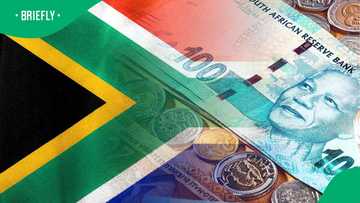Consumer Inflation Falls to 4-Year Low, Mzansi Disagrees: “But the Retail Industry Doesn’t Think So”
- Inflation levels have reached a new four-year low, but South Africans don't see it
- Stats SA revealed that falling fuel prices helped contribute to the inflation levels dropping
- South Africans questioned how inflation was dropping when things were still expensive

Source: Getty Images
Consumer inflation fell to its lowest level in four years, but South Africans don’t see a difference. Statistics South Africa (Stats SA) released a statement recently that revealed that October inflation declined primarily because of falling fuel prices.
Inflation reaches lowest level since COVID-19
Stats SA stated that consumer price inflation was 2.8% in October, a huge difference from the 3.8% in September. According to Stats SA, the decline in petrol and diesel prices contributed significantly towards this.
“Falling fuel prices remain the primary factor behind the slowdown. Petrol and diesel prices declined by 5,3% between September and October.”
The statement also noted how inflation for food and non-alcoholic beverages fell, marking its lowest since November 2019.

Read also
South Africans struggle to manage the rising cost of living, expert offers advice on how to manage
Economy expert details factors driving rising inflation
While inflation has slowed of late, many factors drive it up. Economy expert Suvira Singh recently spoke to Briefly News and detailed some of the most common factors.
She stated that while the obvious answers are loadshedding and water shedding, corruption, high unemployment and poverty levels, there are also other factors that are out of the country’s control:
“As much as we would like to have Covid-19 in the review mirror already and drive off into the sunset ahead, in a lot of ways its effect is still felt in the economy.
“Looking back, there were a lot of industries that took a slump when COVID–19 struck South Africa. Taking into account that South Africa was already struggling with its economic performance and trajectory prior to COVID-19, recovering was not, and still is not easy."
She further explained that the Russian invasion of Ukraine also affected things as Africa, in general, relies heavily on Russia and Ukraine for food and fertilizer imports, which in turn directly affects the cost of food in South Africa.

Read also
Gauteng government spends R28 million on failed project, South Africans furious over wasted funds
The Russian invasion also wreaked havoc on oil prices, with the poorer population in South Africa suffering the effect more.
“The rise in food prices and South Africa’s deteriorating public finances, combined with poor service delivery and lack of effective corruption handling, could trigger more desperate measures by the average South African to get by."
South Africans don’t believe inflation has fallen
The news that inflation levels have fallen has confused social media users, who said they haven’t seen that reflected in prices.
Ruckz Ally asked:
“Which South Africa is this? Consumers beg to differ.”
Robby Solomon Pillay said:
“But the retail industry doesn’t think so.”
Nicholas Alfred Joseph stated:
“By what and whose standard? Facts on the ground do not support this. If anything, for the ordinary man in the street, it is the exact opposite.”
Anesh Maharaj added:
“Good news. However, the lower inflation is not showing its true value yet. Prices of food items are still killing us consumers.”
Sibulelo Keswa said:
“There is no such. Food is very expansive.”
South Africans are struggling to get by
In a related article, Briefly News discussed how South Africans are struggling to cope with the rising cost of living. Single parents have been hit hard, but many explained they struggled to make ends meet even with two salaries in a household.
Sebastien Alexanderson of the National Debt Advisors explained that more people relied on credit to survive.
Source: Briefly News


